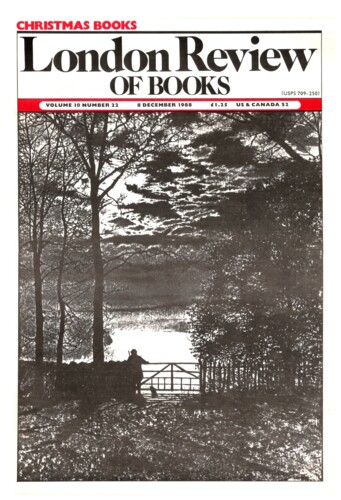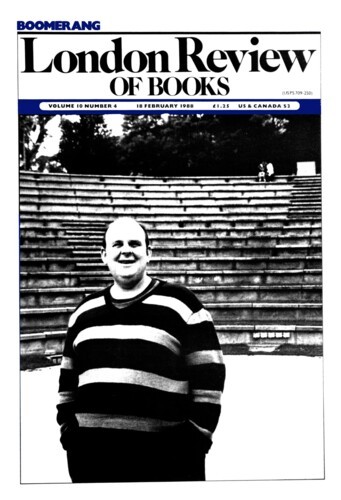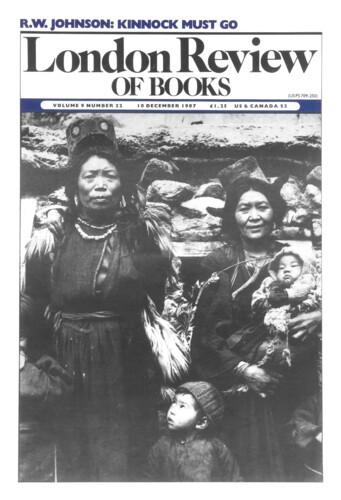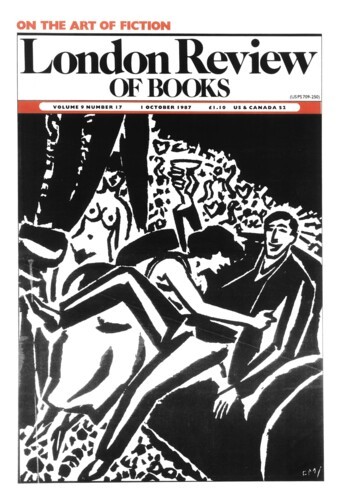Edward Said
Edward Said, who taught English and comparative literature at Columbia, was the author most famously of Orientalism. His other books include The Question of Palestine, Covering Islam: How the Media and the Experts Determine the Way We See the Rest of the World, Culture and Imperialism and Out of Place: A Memoir. He was also an accomplished pianist, and founded the West-Eastern Divan orchestra with the conductor Daniel Barenboim in 1999. He wrote forty pieces for the LRB on subjects including late style, the belly-dancer Tahia Carioca, meeting Sartre, and the Oslo Accords, ‘an instrument of Palestinian surrender, a Palestinian Versailles’. Said’s friend and former neighbour Michael Wood wrote about him in the paper after his death in 2003.
Goodbye to Mahfouz
Edward Said, 8 December 1988
Naguib Mahfouz’s achievement as the greatest living Arab novelist and first Arab winner of the Nobel Prize has in small but significant measure now retrospectively vindicated his unmatched regional reputation, and belatedly given him recognition in the West. For of all the major literatures and languages, Arabic is by far the least known and the most grudgingly regarded by Europeans and Americans, a huge irony given that all Arabs regard the immense literary and cultural worth of their language as one of their principal contributions to the world. Arabic is of course the language of the Koran, and is therefore central to Islam, in which it has a hieratic, historical and everyday use that is almost without parallel in other world cultures. Because of that role, and because it has always been associated with resistance to the imperialist incursions that have characterised Arab history since the late 18th century, Arabic has also acquired a uniquely contested position in modern culture, defended and extolled by its native speakers and writers, belittled, attacked or ignored by foreigners for whom it has represented a last defended bastion of Arabism and Islam.
Alexander the Brilliant
Edward Said, 18 February 1988
Much the best way to convey appreciation of Alexander Cockburn’s rousing and combative prose is to quote him at length. The protocols of reviewing, however, preclude such a practice, so one has to resort to the altogether drearier method of describing what he is about. Recently I mentioned to him that I was reading his book in order to review it. He was calling from Eugene, Oregon (the week before he had been in New Smyrna Beach, Florida, and just before that we had had breakfast in London, to which he had just come from Moscow). ‘Noting with pleasure and admiration the superb prose, the witty observation, the admirable structure,’ he immediately volunteered. Why, in the desert of today’s journalistic mediocrity and cowardly trimming, anyone with Cockburn’s gifts and courage should be modest, or mock-modest, I shall leave to others to discuss. Certainly the darting, cruel and unsparing wit displayed by this oldest son of Claud Cockburn stands out brilliantly in the pages of the Nation, the Wall Street Journal, In These Times, week after week. Few people have the courage to accumulate enemies the way Cockburn has. Starting with Ronald Reagan, whom he twits remorselessly, he has been on the wrong side of the entire US Government, of the New Republic, of Norman Podhoretz, of nearly every journalist of note, left, right and centre, of the New York Times, of the McNeil-Lehrer Report (see in particular his devastating replication of that TV programme’s famous ‘balance’, with the ponderously sober ‘Robin’ McNeil, ‘Jim’ Lehrer and ‘Charlene’ Hunter-Gault studiously examining both sides of the slavery question, Hitler and the Crucifixion), of most academics and of all TV networks, of the rich and the famous, of the military, of Israel, of Thatcher, Kissinger, and many others. He has, it should be added, his softer side, which emerges occasionally in gay or commendatory remarks about family, good cooking (excluding Chinese), figures of stoic calm and moral truthfulness (Israel Shahak, Chairman of the Israeli League of Human Rights), socialism, P.G. Wodehouse.
Miami Twice
Edward Said, 10 December 1987
Despite the media’s unending stream of patriotic talk about ‘America’, one occasionally has a sense of the country’s disunity, its unmanageable extremes, the foreignness of some of its parts to other parts. Riding the Broadway bus recently, I was struck by the driver’s almost beatific reaction to a passenger’s rudeness to him. Instead of screaming back at the offending person, he smiled gently, saying with an air of contentment: ‘Scream all you like. That’s OK. In California they don’t just argue – they shoot each other.’ He was referring to the spate of freeway incidents near Los Angeles, in which impatient or stalled commuters picked each other off with rifles and handguns in the midst of the vast traffic jams.’
Wrong Analogy
1 October 1987
Pieces about Edward Said in the LRB
Going Against: Is There a Late Style?
Frank Kermode, 5 October 2006
The odd thing is that most of the contributors to these books doubt whether it is possible to offer a clear and distinct idea of the subject under discussion. Indeed, Karen Painter, one of the...
A Narrow Band of Liberties: global order
Glen Newey, 25 January 2001
In Being and Nothingness Sartre has an admirable passage about the stubborn human tendency to ‘fill’, the fact that a good part of human life, in politics as elsewhere, is devoted to...
What nations are for
Tom Nairn, 8 September 1994
The politics of dispossession is nationalism – an over-generalisation which at once calls for precise qualification. It is quite true that not all nationalists are dispossessed: possessors...
In the Wilderness
W.J.T. Mitchell, 8 April 1993
The Foundation of Empire is Art and Science. Remove them or Degrade them and the Empire is no more. Empire follows Art and not vice versa as Englishmen suppose. William Blake,...
Off the edge
Frank Kermode, 7 November 1991
The Wellek Library Lectures at the University of California, Irvine, are meant to be about Critical Theory, and up to now they have, for good or ill, been faithful (in their fashion) to that...
Insults
Richard Wollheim, 19 March 1987
Professor Bernard Lewis enjoys a worldwide reputation as a scholar of Near-Eastern history, and in his most recent work, Semites and Anti-Semites, he has chosen to concentrate his formidable...
Textual Harassment
Claude Rawson, 5 April 1984
In a recent review in this paper, Edward Said used the word ‘narrative’ about thirty times. This might have seemed a lot even in the present state of litcritspeak, and even in an...
Arabs
Malise Ruthven, 18 February 1982
Edward Said is the first Palestinian to have stormed the East Coast literary establishment. His achievement has partly been the result of what his more paranoid opponents must regard as his...
Making peace
Dan Gillon, 3 April 1980
The Palestinian problem has been the subject of world-wide debate for more than a decade. Yet the issue is not well understood. The debate, for all its volume and intensity, has rarely managed to...
Read anywhere with the London Review of Books app, available now from the App Store for Apple devices, Google Play for Android devices and Amazon for your Kindle Fire.
Sign up to our newsletter
For highlights from the latest issue, our archive and the blog, as well as news, events and exclusive promotions.




